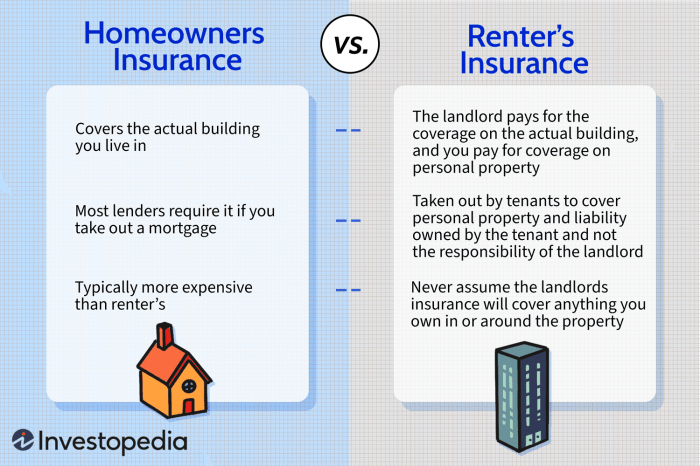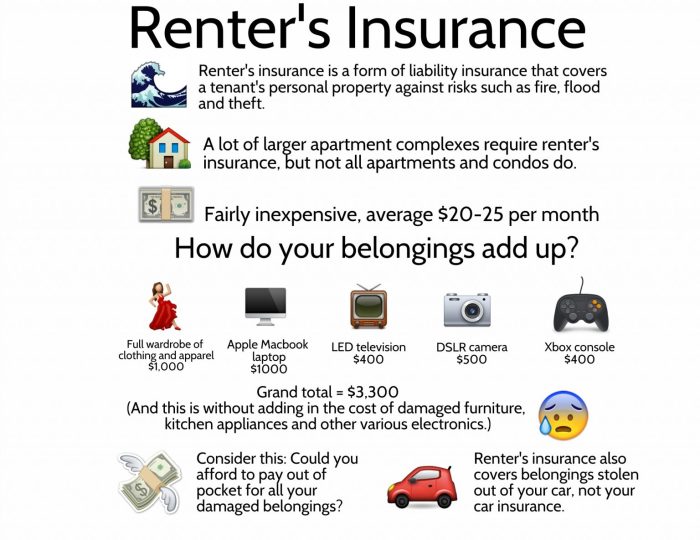Imagine this: a burst pipe floods your apartment, ruining your belongings. Or perhaps a guest trips and is injured, leading to a costly lawsuit. These scenarios, while unsettling, highlight the critical need for apartment renter’s insurance. This comprehensive guide explores everything you need to know about securing the right policy, understanding coverage, and navigating the claims process, ensuring your peace of mind and financial security.
Renter’s insurance, unlike homeowner’s insurance, protects your personal belongings and provides liability coverage while renting. It’s a surprisingly affordable safety net that can prevent significant financial hardship in the event of unforeseen circumstances. This guide will delve into the specifics of policy options, cost factors, and the claims process, empowering you to make informed decisions about protecting your assets and your future.
What is Apartment Renter’s Insurance?

Renter’s insurance, also known as tenant’s insurance, is a relatively inexpensive insurance policy designed to protect your personal belongings and provide liability coverage while you’re renting an apartment or other dwelling. It safeguards your financial well-being in the event of unforeseen circumstances, offering peace of mind knowing your possessions and your liability are covered.
Renter’s insurance typically covers a range of situations that could lead to significant financial losses. Understanding its key components is crucial for making an informed decision about your coverage.
Key Coverages of a Typical Renter’s Insurance Policy
A standard renter’s insurance policy usually includes two main types of coverage: personal property coverage and liability coverage. Personal property coverage protects your belongings from damage or theft, while liability coverage protects you from financial responsibility if someone is injured on your property or you damage someone else’s property. Additional coverages, such as loss of use and medical payments to others, may also be included depending on the policy and the insurer.
Differences Between Renter’s and Homeowner’s Insurance
The most significant difference between renter’s and homeowner’s insurance lies in what each covers. Homeowner’s insurance protects the structure of the home itself, in addition to the homeowner’s personal belongings and liability. Renter’s insurance, conversely, only covers the renter’s personal property and liability; it does not cover damage to the building itself. The landlord’s insurance typically covers the building structure. Therefore, a renter needs their own policy to protect their personal assets and liability.
Examples of Situations Where Renter’s Insurance is Beneficial
Consider these scenarios to understand the value of renter’s insurance: Imagine a fire in your apartment building. Your landlord’s insurance will cover the building’s structure, but your personal belongings – your furniture, electronics, clothing – would likely be destroyed. Renter’s insurance would compensate you for the loss of these items. Similarly, if a guest trips and is injured in your apartment, liability coverage from your renter’s insurance would help cover their medical expenses and any legal fees. Even theft, water damage from a burst pipe (excluding the pipe itself), or damage from a storm could leave you with substantial losses without renter’s insurance. A relatively small annual premium can provide significant protection against these unforeseen events.
Choosing the Right Policy

Selecting the right renter’s insurance policy can feel overwhelming, but a systematic approach simplifies the process. By carefully considering your needs and comparing options, you can find a policy that offers adequate protection at a reasonable price. This involves understanding your possessions, assessing your risk tolerance, and comparing different policy features.
Policy Selection Steps
Choosing the right renter’s insurance policy involves a series of steps to ensure you get the coverage you need. First, accurately assess the value of your belongings. Create a detailed inventory, including photos or videos, to support your claim in case of loss or damage. Next, determine the appropriate coverage amount. This should reflect the full replacement cost of your possessions, accounting for inflation. Then, compare quotes from multiple insurers. Don’t solely focus on price; examine the coverage details, deductibles, and customer service ratings. Finally, review the policy documents carefully before signing. Understand the exclusions, limitations, and claims process.
Bundled versus Standalone Policies
Renter’s insurance can be purchased as a standalone policy or bundled with other insurance products, such as auto insurance. Bundling often offers discounts, simplifying payments and potentially lowering the overall cost. However, standalone policies allow for more flexibility in choosing coverage options and providers, potentially leading to better value if you find a highly competitive renter’s insurance provider. The decision depends on individual preferences and financial situations. For example, someone who already has a car insurance policy with a reputable company might find bundling advantageous, while someone prioritizing specific coverage features might prefer a standalone policy.
Understanding Policy Terms and Conditions
Thorough comprehension of your policy’s terms and conditions is crucial. This includes understanding the coverage limits, deductibles, and exclusions. Coverage limits define the maximum amount the insurer will pay for a specific claim. Deductibles represent the amount you must pay out-of-pocket before the insurance coverage kicks in. Exclusions specify events or items not covered by the policy. For instance, a standard policy might exclude damage caused by floods or earthquakes, requiring separate endorsements for such coverage. Carefully reading the fine print prevents unexpected costs and ensures you are aware of your responsibilities.
Questions to Ask Insurance Providers
Before committing to a policy, asking clarifying questions is essential. The following inquiries can help determine the best fit: What are the specific coverage limits for personal property, liability, and additional living expenses? What is the claims process, including the required documentation and timeframe for settlement? What are the policy’s exclusions and limitations? Are there any discounts available, such as for bundling or security systems? What is the insurer’s customer satisfaction rating and claims handling reputation? Obtaining comprehensive answers ensures you make an informed decision.
Concluding Remarks

Securing apartment renter’s insurance is a proactive step towards safeguarding your financial well-being. By understanding the nuances of coverage, cost factors, and the claims process, you can confidently choose a policy that aligns with your individual needs and budget. Don’t wait for disaster to strike; take control of your risk today and explore the options available to you. Remember, a small monthly premium can provide substantial peace of mind and protect you from unexpected financial burdens.
FAQ Section
What if my landlord’s insurance covers my belongings?
Landlord’s insurance typically covers the building structure, not your personal possessions. Renter’s insurance is crucial for protecting your own belongings.
How long does it take to get a claim approved?
Processing times vary depending on the insurer and the complexity of the claim. However, you can expect a response within a few days to a few weeks.
Can I get renter’s insurance if I have a pet?
Yes, but the premium may be higher depending on the type and breed of pet. Some insurers may have restrictions on certain breeds.
What happens if I move to a new apartment?
You’ll need to notify your insurance provider of your address change to update your policy. Your premium may adjust based on your new location.